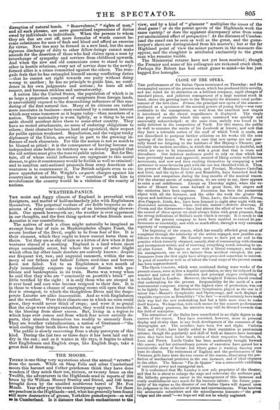CLOSE OF THE OPERA.
THE performances of the Italian Opera terminated on Thursday: and the unexampled success of the present season, which has produced little novelty, and has relied for its attraction on a brilliant company, rapid changes of standard pieces and judicious management of a large musical stock in hand, shows the growing taste in the Metropolis for dramatic vocal perfor- mances of the first class. Ernani, the principal new opera of the season— produced as a specimen of the musical powers of young Italy—was very creditable to the management, as well from the excellent new singers it introduced as the choral magnificence it displayed. The single fine piece of ensemble which this opera contained was quickly and universally acknowledged: at the same time, melody was found to be sadly deficient in the composition of Verdi. For this reason, the public do well to examine the merits of his Lombardi at leisure; and now that they have a tolerable notion of the stuff of which Verdi is made, are not disinclined to postpone further criticism on his works till the next opening of the house. We are not sure that new operas are not gene- rally found too fatiguing to the habitués of Her Majesty's Theatre;• par- ticularly the modern novelties, in which the entertainment is doubtful, and which are sure to be intermixed with a great deal that is worn and threadbare. Our indolent audiences prefer to rely on that which has been previously tasted and approved; assured of liking certain well-known movements, and now and then exciting themselves by comparing a new performer in some favourite part with the one last identified with it. Thus, the powers of Mesdames Rossi Caccia and Persiani, Mesdames Castellon and Grisi, and the styles of Grisi and Brambilla, have furnished food for criticism and comparison during the long months of the musical season. For the abstract merits of composition, we are sorry to say, there appears to exist a sad indifference. Except on Thursday nights, when the vo- taries of Mozart have come forward in great force, the singers and the orchestra have been supreme. Execution has been the paramount object with all the listeners, and the older the work the greater the repose and indolence of enjoyment. Thus, Lucia, the Sonnambula, Norma, Don Pasquale, Linda, &c., have been listened to night after night with un- diminished satisfaction. Three revivals, indeed—Roberto Deoereux, Ii Pirate, and the Giuramento--have had almost the effect of new works. Te the second of these operas we shall always listen with great pleasure, from the strong indications of Bellini's merit which it reveals. It is much to the credit of the present company to have been enabled to extend its per- formances so constantly, and with so much effect, through a very extensive repertory of compositions.
The beginning of the season, which has usually afforded great cause of complaint through the inferiority of the artists engaged, now justifies con- fidence in the manager. Mr. Lumley seems to have put an end to the practice which formerly obtained, namely, that of commencing with obscure and incompetent artists, and of reserving everything worth listening to un- til after Easter. He begins at once with a liberal company; and under his management, one or two failures from accident excepted, the per- formances from the first night have always presented somewhat to interest. In point of number as well as of talent the vocal corps of the present season has been unprecedented. The Opera Concerts, which were continued during some weeks of the present season, were at first a hopeful speculation, as they far eclipsed in the number and talent of the orchestra and principal singers everything of a similar kind in London. However, the weight of Feficien David crushed that undertaking for the present. Responsibility for the merit of a new instrumental composer, aiming at the highest class of production, was not to be lightly borne. But Beethoven's Symphonies, played as the one in C minor was—Mozart's Symphonies and Opera-songs, and such displays of exquisite expression as Brambilla's " Cite far& "—would certainly have made their way had the new undertaking had but a little more time to make itself known. We hope that, with such means for fine concert pet formanees as Mr. Lumley possesses, his attention may still be directed towards that fair field of enterprise. The attractions of the Ballet have contributed in no slight degree to the success of the season. They have consisted, however, more in personal display and rivalry than in any fresh development of the resources of the choregraphic art. The novelties have been few and slight. Carlotta Grisi and Cerito have hardly added to their reputation as pantomimic artistes; though the popularity and skill of both as dancers have increased since they have been under the tuition of their respective husbands, St. Leon and Perrot. Lucile Gmhn has been assiduously brought forward this season; and her extraordinary powers of execution have gained her a considerable share of favour: but where grace is wanting dancing soon loses its charm. The retirement of Taglioni and the performances of the Viennese girls have been the two events of the season; illustrating the per:. fection of mechanical precision in the one instance, and of ideal elegance in the other. The famous "Pas de Quatro " was a memorable exhibitiOa of executive power and managerial tact. It is understood that Mr. Lumley is now sole proprietor of the theatre; and that he is about to enlarge the stage and redecorate the audience part. His hitherto prosperous career in the management of this immense and costly establishment says much for his business talents: the future popu- larity of his regime as the director of our Italian Opera will depend upon his judgment in the selection of artists and entertainments. What between the aristocratic subscribers and the miscellaneous listeners—" the great vulgar and the small "—we hope an will not be wholly neglected.


























 Previous page
Previous page